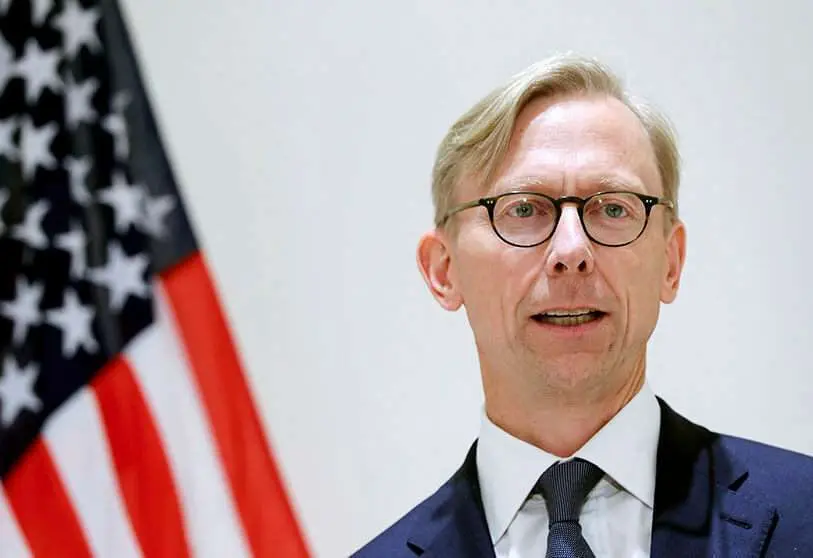Brian Hook resigns as U.S. Special envoy to Iran

Brian Hook resigned this Thursday as US special envoy for Iran, according to the US State Department, which has immediately appointed Elliott Abrams, the current special representative for Venezuela, to the post.
"Brian Hook has decided to resign from his post," said Secretary of State Mike Pompeo, who highlighted the "historic results" obtained by Hook in "confronting the Iranian regime" during the two years he has been special representative for the Persian country.
In this sense, Pompeo said in an official statement that he "successfully negotiated with the Iranians the release from prison of Michael White and Xiyue Wang", and added that he also played an important role as director of Policy Planning, from where he "set in motion a series of strategies that advanced the security interests of the United States and its allies".
"He has been a trusted advisor and a good friend of mine, and I thank him for his services," said the U.S. secretary of state, who announced that Abrams will combine this new position with his role as special representative for Venezuela.
Brian Hook had already indicated in declarations to The New York Times that he was going to present his resignation and argued that US policy against Iran had caused "the collapse of its finances"; although he added that Washington "would like to achieve a new nuclear agreement with the regime".
"From almost every point of view, the regime and its terrorist allies are weaker than they were three and a half years ago," Hook said, referring to Donald Trump's arrival at the White House. "Agreement or no agreement, we have been very successful," he said.
The situation between the United States and the Islamic Republic of Iran has become very acrimonious following the abandonment in 2018 by Donald Trump's administration of the nuclear pact (JCPOA) sealed in 2015 with Iran and powers such as the United Kingdom, France, Germany, Russia and China, which limited Iran's atomic program, mainly in the area of weapons. The United States denounced breaches of terms on the part of the Persians and imposed political and financial sanctions on the regime of the ayatollahs, including a ban on trade in oil, the main source of Iranian funding.
This provoked the reaction of Hassan Rohani, president of Iran, who threatened to continue trading with his crude oil, to blockade the Strait of Ormuz (the main passage zone for world oil trade) and to violate clauses of the JCPOA, especially those related to uranium enrichment and the treatment of heavy water.
In this scenario, there were incidents related to cargo ships in Gulf waters and attacks on oil and airport infrastructure in Saudi Arabia, Iran's great rival in the Middle East and the main representative of the Sunni branch of Islam, as opposed to the Tehran-sponsored Shiite one.
The international community and many Arab countries pointed to Iran and related Shiite groups, such as the Hutu rebels, as being behind these incidents that endangered regional and global security.
The economic blow caused by the US sanctions hit Iran hard, as it sought new partners in the international arena, such as Qatar and Turkey. Both the Gulf monarchy and the Eurasian country are also singled out for destabilizing world peace. The Qatari state has been under an embargo since 2017 implemented by the Saudi kingdom itself, the United Arab Emirates, Bahrain and Egypt, which accuse the Qatari nation of supporting cross-border terrorism. Meanwhile, the Turkish country presided over by Recep Tayyip Erdogan is leading a belligerent campaign in the Mediterranean to improve its geostrategic position and to take greater advantage of gas and oil prospecting in the Mediterranean arc; an activity that is centred on Turkey's active participation in the wars in Libya and Syria, in which it even acts in collaboration with paid mercenaries linked to groups in the past with terrorist organisations such as Daesh and Al-Qaeda, as various media have pointed out.
Now Elliott Abrams arrives at the post of US special envoy to Iran, which means the bet for a hard line position of the Trump Administration against the Persian state, which it accuses of a dangerous activity in the Middle East. Abrams was a distinguished fellow at the Institute for Middle East Studies at the Council on Foreign Relations in Washington; and he also served as deputy assistant to the president and deputy national security adviser in the administration of President George W. Bush, where he oversaw U.S. policy in the Middle East.








